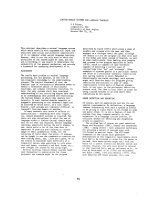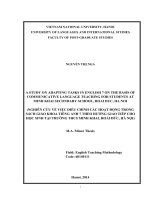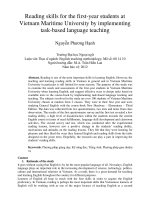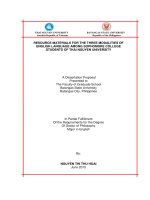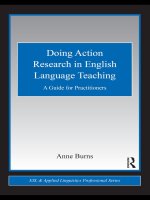Slide presentation Materials for language teaching
Bạn đang xem bản rút gọn của tài liệu. Xem và tải ngay bản đầy đủ của tài liệu tại đây (159.59 KB, 17 trang )
May 10, 2012
Presentatio
n
Adapting published
material
Group 6
1. Tran Thi Tam Linh
2. Tran Thi Trang Loan
3. Nguyen Thi Xuan Mai
4. Le Dieu Ha
1. Why adapt course
Despite the range and variety of
published material on the market, it is
rare to find a perfect fit between needs
and course requirement. In addition,
every learning/teaching situation is
unique and depends on factos such as
these:
•
+ The dynamics of the classroom
•
+ The personalities involved
•
+ The constraints imposed by syllabuses
•
+ The availability of resources
•
+ The expectations and motivation of the
learners
Material can nearly always be improved by
being adapted to suit the particular
situation where it is being used.
•
2. When to adapt
•
•
•
•
•
Adapting materials involves one or
more of the following:
+ leaving out some parts of the
material
+ adding material (published or your
own)
+ replacing material with something
more suitable
+ changing the published material to
make it more suitable for your use
• The following diagram will help in deciding
whether to adapt an exercise or other activity:
Objective of
activity suitable?
yes
no
Methods
appropriate?
ye
s
yes
Use as it
stands
Omit or
replace
no
Content/topic
suitable?
Change
or
replace
no
Keep method and
objective but change
content or topic
3. SUPPLEMENTING
AND REPLACING
MATERIAL
• A Course book may need supplementing
in a number of different areas,
• but among the commonest are:
• Reading
• Listening
• Pronunciation
• Vocabulary
• Grammar
Advantages of using books which focus on such skills is
easy to find exercises at a lower or higher level than
regular course book being used.
It base on the learner level.
+ Supplementary pronunciation learning material.
It is used in Books
such as English Aloud 1 and 2(Haycraft),
Elements of Pronunciation (Moretimer 1985)…All
of which due which aspects of pronunciation at
different levels.
+ Supplementary vocabulary learning materials.
The learner can have opportunity to widen their
vocabulary in connection with topic which interest
them.
+ Supplementary grammar learning materials.
Many students will benefit from additional material
that gives explanations and rules in straightforward
language together with practice exercises on each
grammar point.
4. A new role for the course
book: inspiration and
creativity
Strengths and
weaknesses of
the coursebooks
Adaptation and
possibilities of
further
development
Contain a lot of good ideas
for teaching (the actual
examples may not be quite
right for a particular class)
4. A new role for the course book:
inspiration and creativity
• Teacher can base the
development of their own
materials on ideas from the
book.
• Teacher can work in more
personal and creative way, with
confident and originality.
4. A new role for the course book:
inspiration and creativity
• A positive approach to publish
materials involves looking below
the surface for underlying ideas
that are good and can be
developed further. If the basic idea
is good, it can probably be used
with different subject matter, with
different contextualization or with
a different skills focus
5. SOME EXAMPLE OF ADAPTING
MATERIALS
• 5.1. Personalizing drills to make them
more relevant
• - The drill is straightforward and gives
adequate practice in the mechanics of
using with present and future
reference
• - Taking the drill as a starting point by
personalizing the content, whilts
keeping the forcus on the structure.
• - The important points are that
students are talking about their own
experiences in reak life, and are
communicative with one another
through English.
• Ex: Give some answers like the ones in
the box:
• Do you have to water the flowers
taday?
• Yes, I have to water it today. I will
have to water it tomorro, too
• Do you have to help your mother
taday?
• Do you have to do your homework
today?
• ….
• 5.2. Using authentic content
• - Authentic content is using real facts
and information instead of made up
content
• - Using the ideas and the activites with
some authenic content which will be
interesting to the students and provide
the opportunity to learn.
• - The important thing is to learn what
students are intrested in and build on
that.
• Ex: Reading information about river
Thames, answer the following
questions:
• River Thames
• One of the most famous rivers in the world, the
Thames runs for 216 miles from source to sea
and is steeped in lore along virtually its entire
route.
• Rights of navigation were laid down in Magna
Carta, but the river's history extends much
further. Festivals and rituals such as the Boat
Race, Henley Regatta and the annual Swan
Upping imbue a character found nowhere but Old
Father Thames.
• Under the authority of the Environment Agency,
the non-tidal Thames can be navigated for 135
miles from Cricklade to Teddington Lock, passing
through 44 picturesque locks and near almost
150 wildlife sites. You can discover it by boat or
from the Thames Path, one of Britain's most
popular National Trails.
• Where does the Thames flow into?
• Can you discover the Thamse by boat?
• ….
• 5.3. Making dialogues communicative
• - Dialogue work is a necessary part of language
and helps to develop a degree of fluency,
particularly in the semi – automatic aspects of
language use, such as routine exchanges.
• - The participants in the dialouge are told what to
say, and more or less how to say it, giving them
little freedom for self expression.
• - Turning the dialouge into a pair of cue card is
very simple which make students can fill in it
more easily.
• Ex: complete the dialouge
• A: …………….
• B: Me, in New York
• A:………………,too
• B: Yes, they were.
• A:………………..
• B: At school?well, I was not very good
• 6. Adapting outdated coursebook
Teacher and student around the world often find
themselves having to use coursebooks which are old
and outdated in content. But some of these
coursebook s contain sound ideas which we can use
until now.
• For example: the book “ Guided composition exercises
(Spencer 1967):
• Write the following passage out again, adding, in the
spaces indicated by numbers, one verb from the lists
with the corresponding numbers given below the
passage. In each group of three verbs one is more
appropriate in the context than the other two:
• The boy (1) the wall to (2)the apple. He (3) half-adozen and (4) them in his pocket. As he was (5) down
again he slipped and (6). The fruit in his pockets was
squashed. He did not (7) himself, but he could not (8)
the apples either. He (9) home and (10) his coat
pockets.
•
6. Adapting outdated coursebook
1. Climbed, leapt, ascended
2. Discover, reach, inspect
3. Plucked, seized, picked
4. Hid, put, laid
5. Jumping, slipping, falling
6. Slid, collapsed, fell
7. Wound, hurt, cut
8. Ear, taste, use
9. Marched, limped, ran
10. Cleaned, washed, changed
This exercise teaches the learner’s ability to use
appropriate vocabulary items, selected
according to different criteria.





